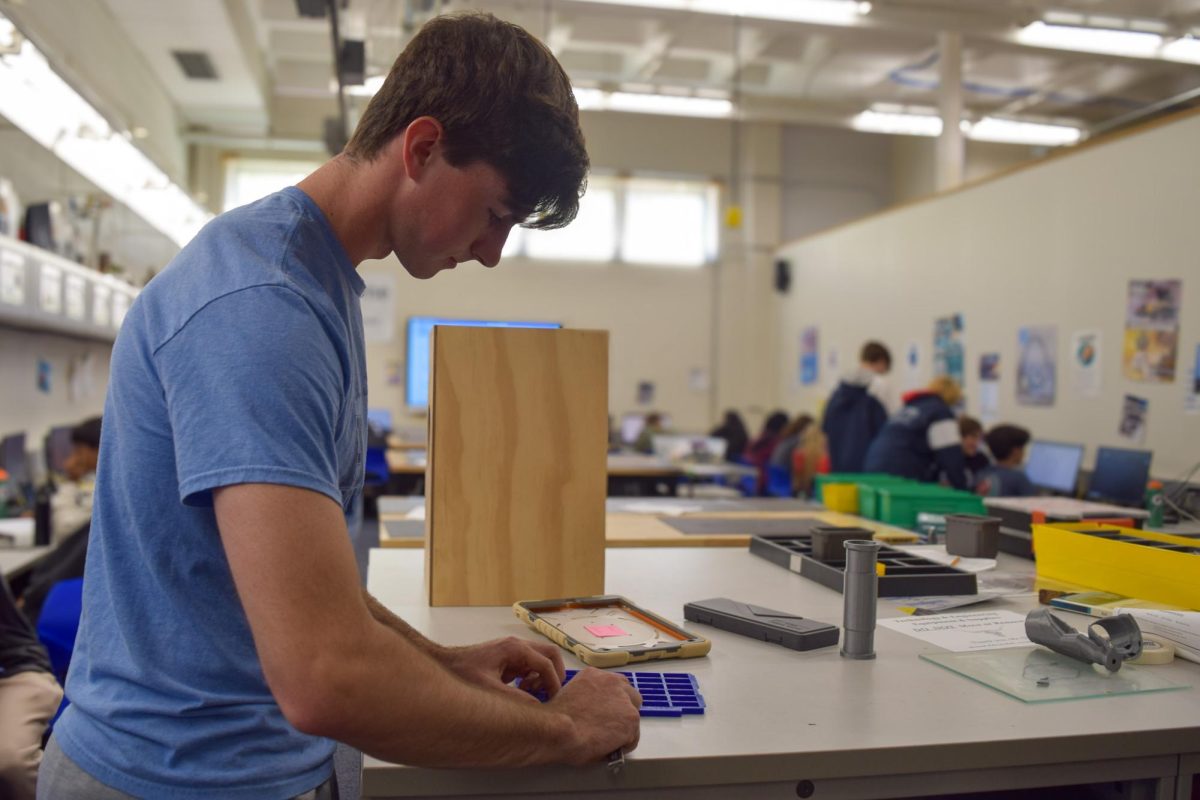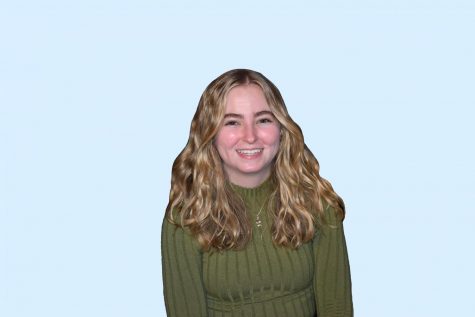Between planning walkouts, doing an ecology internship and studying abroad in Australia, 2016 alumna Shannon Anderson keeps herself busy while going into her third year at Emory University, studying biology with a minor in environmental science.
“I chose my major freshman year of high school, and I’ve never really changed my mind. It’s always been something that was a pretty sure thing for me,” Anderson said. “I’ve always really loved being outside and learning about living things, and I’ve realized the career I want to go into includes me being outside and continuing to help the environment in different ways.”
Despite Anderson’s passion for biology and the environment, she still finds it difficult to stay focused on her work at times, especially after her change in pace from high school to college.
“In high school, I think I spread myself really thin, and I was constantly going from club meetings to sports practice to events to whatever else. In college, I think I’ve narrowed down my focus to what I really find valuable to be involved in and that’s left me with quite a bit of free time, which is something I didn’t really have in high school,” Anderson said. “I think that using your free time wisely is one thing that I haven’t had to deal with before because I only had a little bit of free time in high school. It takes a lot to force yourself to do what you’re supposed to be doing when you have so much time, and it feels like your deadline is so far away. I think leaving my room to go study and meeting up with friends for study groups is something that’s really helped me with that.”
Although she has more free time in college than high school, taking classes like Organic Chemistry, Genetics and Engineering Physics demands much of her time.
“I think I’m pretty level-headed, and I don’t get that stressed. I kind of use it because I perform well under pressure. However, I think taking a chance to recharge after a week that’s been particularly stressful is something I started to prioritize in college because it seems like college professors coordinate all of their finals and all of their essays to happen at the same time,” Anderson said. “There are always weeks that are much harder than the rest of the semester as a whole, and I think that just being really conscious about taking it easy for a few days after that is something important to me.”
Along with taking time for herself after difficult weeks, Anderson feels that high school helped to prepare her for the higher level classes in college.
“Parkway West really prepared me for doing well in college because it offered such a wide variety of classes and subjects that I was interested in. It kind of gave me a venue to explore those interests without the high pressure like you have in college sometimes,” Anderson said. “I think I had exposure to a lot that some other people in college around me didn’t, and it’s given me confidence going into classes and tests because I feel like I’ve genuinely prepared for whatever is going to happen.”
Anderson’s internship has allowed her to work outside most of the time, reaffirming the career paths she is interested in. She was hired by the National Great Rivers Research and Education Center (NGRREC) and specifically works at Illinois Wesleyan University in Bloomington, IL.
“I go out in the field with my advisor and a couple of other students who are doing research projects here. We walk around in rivers collecting mussels, measuring them and putting them back where we found them. Mussels give us an idea of stream health, so when we find a diverse, healthy collection of mussels in a certain area, that tells us that the ecology of that stream is doing well,” Anderson said. “Other than that, I have obligations I have to fulfill for NGRREC where I have to submit things every couple of weeks, then present them to my fellow interns and adviser.”
Working full time, Anderson feels that her interest in ecology is what makes this internship pay off.
“A really exciting moment for me was during a 12 hour day when we found three endangered species, making it all worth it,” Anderson said. “I was just sitting there after thinking about how great of a day that was for me, and how nerdy it was that I thought that was a great day. I was also kind of accepting my nerdiness because that kind of work has been really monumental for me this summer.”
Studying abroad in Australia this summer, Anderson will arrive two weeks late because she has to finish this internship. In Australia, she’ll be studying Aboriginal Sydney Marine Ecology, taxonomy and American Literature at the University of New South Wales.
“I chose to go to Australia because I wanted to do something that was really a once in a lifetime opportunity. I thought about it a lot, and I realized I could always go to Europe and travel around because that’s a really common type of vacation to take. However, to spend four and a half months in Sydney, Australia is probably something I’d never get to do again,” Anderson said. “I think what I’m most nervous for is making friends and catching up with the two weeks of work that I’ll be missing, but I’m really excited for everything else. One of my classes has a week-long field trip during spring break that I’ll get to go on and all kinds of cool options like that. I know it’ll be great once I get settled in, but I’m definitely nervous now.”
Outside of college, Anderson makes sure to recognize the privileges she has and stay involved in her community, believing that volunteering and being socially aware is a responsibility for all citizens. She volunteers at Re:Loom, an organization that employs homeless women, along with attending protests for issues like Black Lives Matter and the Dakota Access Pipeline.
“I think that actively volunteering in your community is in itself a form of advocacy because you’re getting to know the people that you need to advocate for. It’s something that I need to do to be someone who considers themselves part of this country and part of the human race,” Anderson said. “I think that if you have a platform you might as well stand on it. Growing up white and having the privilege to go all the way through high school and now being in college, I have that platform–I will have credibility behind my name when I graduate. So if I am able to do something for people whose voices have been taken away, then I definitely feel obligated to do so. If there’s ever a time when I can speak up for someone whose voice has been silenced, I’m going to try to do that.”
Specifically, she helped plan two walkouts against gun violence at Emory, along with being in charge of the logistics committee for March For Our Lives.
“It was me, a couple of other college students and about 20 or 30 high school students all on one phone conference call, and we were planning the National School Walkout. It was really evident from that first conversation that everyone who was on the call was really impassioned about the event and just energized to do something. We were so distraught about what was happening,” Anderson said. “I said we should just channel that energy into planning the March For Our Lives because one of the adult advisors on the call was like, ‘you know, I don’t think anyone has started planning an Atlanta branch of the march–would you all be interested in doing that?’ There was kind of a slow, ‘yeah, actually, that would be really great; we should do that. Oh my gosh, we can do this!’”
Despite her excitement about the prospect of working with students just as passionate as her, Anderson soon realized that some people were not as willing to give the same level of commitment to the cause as she was.
“It was really obvious who was there for a resume-building opportunity or to have something really fun to write a college essay about and who was there because they genuinely wanted to ignite change. I think coming to terms with the fact that not everyone was motivated in the same way that I was, was an important moment of growth for me,” Anderson said.
Along with the challenges she faced with group dynamics, working on the walkouts and march often interfered with class and studying time.
“It kind of became my entire life for the month leading up to it. I was on a conference call every day, talking on the phone to people, sitting in on city council meetings or meeting with Emory faculty. I missed so many classes for meetings with city officials, but I wouldn’t take any of it back because it was an amazing experience,” Anderson said. “I think balancing school obligations with planning, going to meetings, going to class when I could and turning in assignments on time was definitely a struggle.”
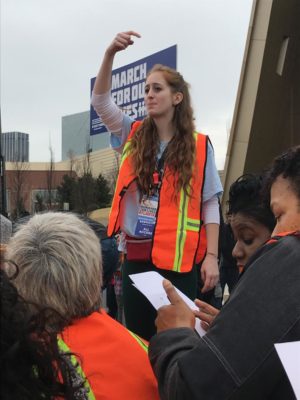
Directing the crowd, alumna Shannon Anderson leads marchers along the route for March For Our Lives in Atlanta, GA.
After weeks of organizing the march, Anderson was blown away by the results.
“It was absolutely crazy. I was so taken aback the day of the march in Atlanta–I could not believe how many people showed up. It was really unlikely that no one was going to come, but in the back of our heads, there was the possibility that we would be standing there with bullhorns, and there would be no one standing in front of us. It was really exciting not having that happen, but then it went beyond my wildest dreams,” Anderson said. “Between all the buildings, there was just masses of people, and you couldn’t even see the end of it. I also think that seeing the variety of people that showed up was amazing. We were bringing together members from all different parts of the Atlanta community and that was just so humbling to see.”
Feeling passionate about many different social justice issues, Anderson hopes that the activism sparked from the Parkland shooting causes more young people to be aware of their relationship with the government.
“I think in many aspects of my life I stand up for things that I don’t think are right. So when I read about the Parkland shooting, I was just kind of crushed, and I was like crying in my room even though this didn’t even have a direct impact on me, my life or anyone I knew,” Anderson said. “Issues like this highlight a lot of the problems with how young people interact with the government and how many young people don’t vote, so I just hope that after the Road to Change Project and the march, some of those people’s minds have been changed a little bit.”
With so much on her plate, Anderson finds motivation from her desire to achieve as much as she can.
“I think it’s probably just coming from an ambition to get the most out of life that I possibly can,” Anderson said. “Maybe I’ll change my mind when I’m old and have a dog and stuff, but for now, I feel like since I have the energy and time, I should do as much as I possibly can while I still have my health and the ability to do everything that I want to do.”

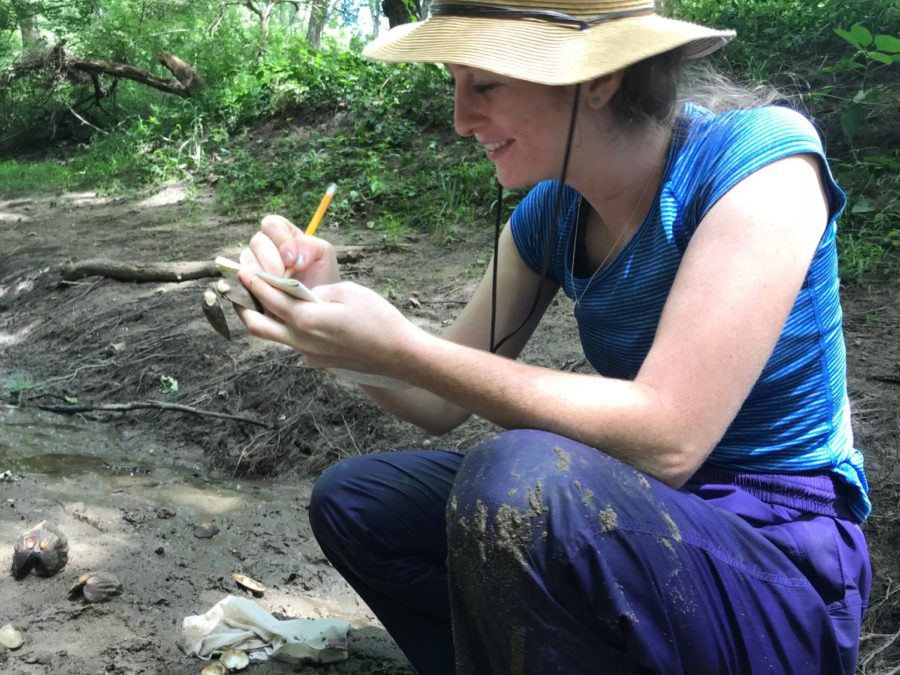


![Focused on providing exceptional service, sophomore Darsh Mahapatra carefully cleans the door of a customer’s car. Mahapatra has always believed his customers deserve nothing less than the best. “[If] they’re trusting us with their car and our service, then I am convinced that they deserve our 100 percent effort and beyond,” Mahapatra said.](https://pwestpathfinder.com/wp-content/uploads/2025/10/DSC_0018-1200x800.jpg)
![Sophomore Aleix Pi de Cabanyes Navarro (left) finishes up a soccer game while junior Ava Muench (right) warms up for cross country practice. The two came to Parkway West High School as exchange students for the 2025-2026 school year. “The goal for the [exchange] program is to provide opportunities for both Parkway students and our international exchange students to learn about other cultures, build connections and become confident, capable, curious and caring — Parkway’s Four C’s — in the process,” Exchange Program Lead Lauren Farrelly said.](https://pwestpathfinder.com/wp-content/uploads/2025/10/Feature-Photo-1200x800.png)

![Gazing across the stage, sophomore Alexis Monteleone performs in the school theater. The Monteleone family’s band “Monte and the Machine” has been releasing music since 2012, but Alexis started her own solo career in 2024 with the release of her first single, Crying Skies. “My whole family is very musical, [and I especially] love writing [songs with them],” Monteleone said.](https://pwestpathfinder.com/wp-content/uploads/2025/09/DSC7463-1200x798.jpg)
![Amid teaching a lesson to her AP Calculus BC class, Kristin Judd jokes alongside her students in their funny remarks. Judd has always enjoyed keeping the mood light in her classroom, along with on the volleyball court. “[I enjoy] that side talk where you see [or] overhear a conversation and chime in, or somebody says something funny,” Judd said.](https://pwestpathfinder.com/wp-content/uploads/2025/09/image-1200x730.jpg)
![Eyeing the ball, junior Ella McNeal poses for her commitment pictures at Clemson University. McNeal’s commitment comes after months of contact with top Division 1 soccer programs. “ It has taken a lot to get to where I am, but I know that [what] I've already been through is just the beginning, and I can't wait for what is to come,” McNeal said.](https://pwestpathfinder.com/wp-content/uploads/2025/09/IMG_4926-1200x900.jpeg)

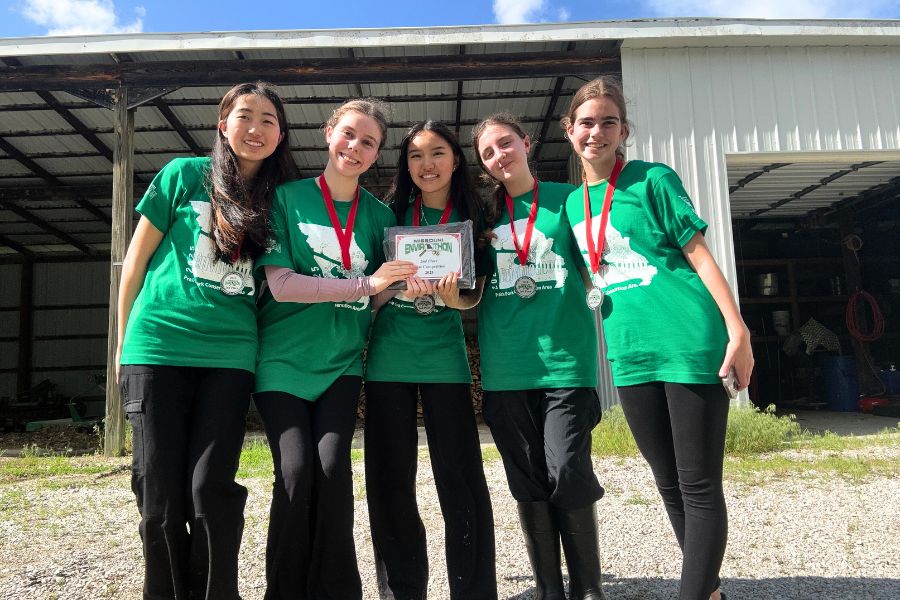
![Senior Adam Zerega stands with senior Dexter Brooks by farm equipment. Zerega often worked with friends and family on his farm. “I've been able to go to my family's farm since I was born. I [spend] at least three weekends a month [on the farm], so I'm there all the time,” Zerega said.](https://pwestpathfinder.com/wp-content/uploads/2025/04/IMG_4872-1200x900.jpg)
